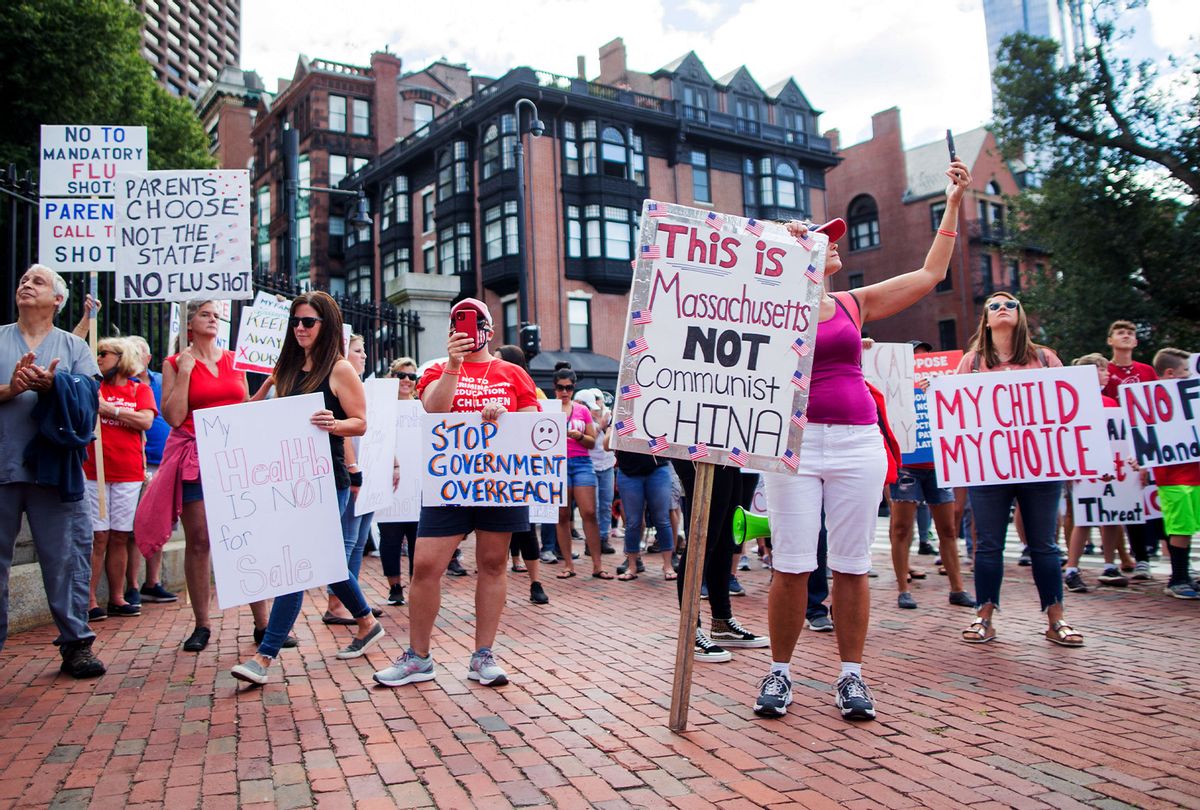Each day millions of people are getting their COVID-19 vaccines. More than 40 percent of Americans have received at least one dose of the COVID-19 vaccine, and more than 25 percent of the population is fully vaccinated. Despite this progress, public officials are concerned that the country is on the precipice of a new challenge — one in which supply of the vaccine will outweigh demand for it.
Mass vaccination sites, according to The New York Times, are already closing due to a decline in demand for the vaccine. An estimated 1 in 5 American adults remain unwilling to get vaccinated, according to the Monmouth University Poll, prompting fears that vaccine hesitancy could keep the country from reaching herd immunity and truly getting the pandemic under control.
But does that mean that all the people who say that they won't get the vaccine are "anti-vaxxers"? Not necessarily. And experts who study vaccine hesitancy and anti-vaccine organizations are sounding the alarm that there's an important distinction between someone who's "vaccine hesitant," a "vaccine refuser" or an "anti-vaxxer," especially during this critical phase of the pandemic. Lumping everyone together in the "anti-vaccine" category might deter those who are skeptics and hesitant, as opposed to those who might actually have an anti-vaccine agenda, hampering campaign efforts to get skeptics vaccinated altogether.
"Some figures have a tendency to call people that they disagree with anti-vaxxers, which is kind of unfortunate," David Broniatowski, an associate professor in the Department of Engineering Management and Systems Engineering at George Washington University, told Salon. "And it creates an environment in which you can't really have the conversations with vaccine hesitant people that you need to have in order to actually change their minds."
Broniatowski, whose research focuses on behavioral epidemiology and group-decision making, emphasized there's a "spectrum" of vaccine hesitancy that needs to be better understood.
"Hesitancy can mean anything from 'Yeah, I'm going to do it, but I'm a little nervous,' to hardcore refusers who say 'Well, I don't think I'm ever going to do it,' and those people, by the way, can change their minds," Broniatowski said. "I think we have to be very careful not to demonize people with whom we disagree, even if we're disagreeing on something as important as vaccination."
Want more health and science stories in your inbox? Subscribe to Salon's weekly newsletter The Vulgar Scientist.
Broniatowski said that's not to say that individuals with an explicit anti-vaccine agenda don't exist. But he often looks to see if a person is directly affiliated with an anti-vaxx organization before assuming they hold a deeply-entrenched belief.
"I think the most important thing is to distinguish between people and organizations," Broniatowski said. "A person can change their mind, and an organization has a charter or a mission statement and they don't change their minds. So you could have an anti-vaccine organization, and no matter what you do as long as the person you're talking to is representing that organization, you're wasting your time."
According to The Anti-Vaxx Playbook, published by the Center for Countering Digital Hate (CCDH), there are three key messages used by anti-vaccine groups and anti-vaccine "celebrities": 1. COVID-19 is not dangerous; 2. The vaccine is dangerous; and 3. Doctors and scientists cannot be trusted. When people on social media are explicitly pushing conspiracy theories, Broniatowski said these people likely fall into the "anti-vaxxer" category.
"A vaccine hesitant person might have heard something like that, either online or somewhere else, and they may believe it," Broniatowski said. "But when somebody is making that stuff up, and they're actively producing that material as opposed to consuming it, that's a pretty clear sign that they're probably an anti-vaxxer, right? And they're probably associated with an anti-vaccine organization."
As a separate report from the CCDH found, 65 percent of anti-vaccine content on social media is linked to just 12 individual accounts, including those of Joseph Mercola, Robert F. Kennedy, Jr., and Sherri Tenpenny, the author of four books opposing vaccination and supporter of the disproved belief, based on a debunked medical journal paper that has since been formally retracted, that vaccines are linked to autism.
In response to messages being spread by anti-vaxxers on social media, the CCDH recommends focusing on the following messaging: COVID is deadly; vaccines are among the safest and most effective human inventions of the past two centuries; and doctors, scientists and public health professionals are in their chosen professions because they want to help people.
Dr. Kasisomayajula Viswanath, a professor of health communication at the Harvard T. H. Chan School of Public Health and Dana-Farber Cancer Institute (DFCI), told Salon it's important to understand the "drivers" behind vaccine hesitancy, which will help public health officials address these concerns and hopefully get people vaccinated. For example, he said a Black American might be hesitant due to previous experiences with racism and discrimination in healthcare, and prefer to take a wait-and-see approach with the COVID-19 vaccine.
"That's very different from a group of people who are outright refusers who say 'No, this is my freedom,'" Viswanath said. "Personal liberty is one of the biggest drivers."
Viswanath agreed that taking the spectrum of vaccine hesitancy seriously is "very critical" when it comes to the COVID-19 vaccines.
"What COVID-19 has done, unlike in the childhood vaccines issue, COVID-19 has pretty much upended everything we are doing in our lives," Viswanath said. "And so there is some consideration and really this urgency in looking at the spectrum much more carefully and developing the campaigns, more than ever, because it has brought everything to a halt, so to speak."



Shares